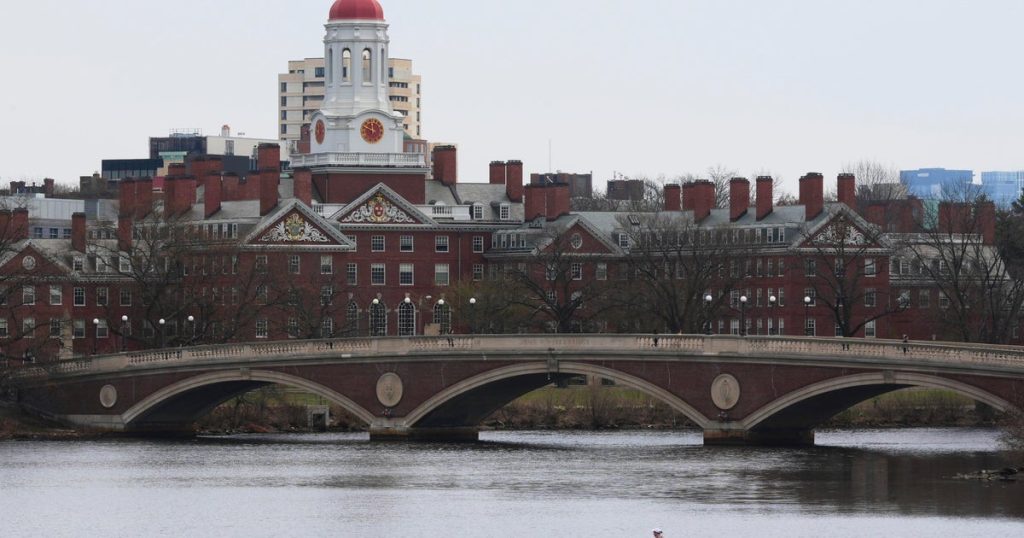In a significant legal battle, a federal judge has issued a preliminary injunction preventing the Trump administration from revoking Harvard University’s ability to enroll international students. This decision stems from a government directive that claimed the university had lost its privilege due to alleged failures in addressing campus antisemitism. Although President Trump hinted at potential negotiations to resolve issues between his administration and Harvard, the court ruling allows the university to continue its international student programs while the case progresses.
| Article Subheadings |
|---|
| 1) Legal Proceedings and Judicial Rulings |
| 2) The Trump Administration’s Stance |
| 3) Implications for International Students |
| 4) Government’s Approach to University Policies |
| 5) Broader Context of Tensions |
Legal Proceedings and Judicial Rulings
The legal battle began when the Department of Homeland Security (DHS) informed Harvard in May that it was revoking its certification to access the Student and Exchange Visitor Information System (SEVIS). The government argued that this privilege was contingent on the university’s compliance with federal expectations, particularly concerning its handling of antisemitism on campus. Harvard responded with a lawsuit, asserting that the revocation was a politically motivated punishment for the school’s refusal to align with Trump’s administration. U.S. District Judge Allison Burroughs granted a preliminary injunction in favor of Harvard, allowing it to continue enrolling international students. This ruling builds on an earlier temporary restraining order that had similar provisions.
The Trump Administration’s Stance
In a series of public statements, President Trump expressed optimism about reaching an agreement with Harvard. He took to social media to allege that negotiations have been conducted fruitfully with the university and hinted at a potentially historic settlement. “They have acted extremely appropriately during these negotiations,” he claimed, suggesting that a resolution would benefit the country at large. However, Trump’s tweets lacked substantial details about the proposed deal, leaving many questions unanswered about the practical implications for Harvard and its international student body.
Implications for International Students
The outcome of this legal tussle could have dire ramifications for the international student community at Harvard, which comprises approximately 25% of its student body. In light of the Trump administration’s prior suggestion to cap foreign student enrollment, many are concerned about the long-term viability of international programs. Furthermore, Secretary of State Marco Rubio has ordered additional scrutiny for anyone attempting to travel to Harvard, including students, faculty, and guest speakers. The action forms part of a broader trend of intensified vetting processes aimed at assessing the loyalty of international students to the United States. All these developments highlight an increasingly restrictive atmosphere for foreign students seeking education in the U.S.
Government’s Approach to University Policies
The Trump administration’s challenges to Harvard are emblematic of a broader strategy aimed at reshaping higher education policies nationwide. The administration has pressured Harvard to adjust its policies for maintaining financial relationships with the government, expressing dissatisfaction with various aspects of university governance, including diversity programs. When Harvard declined to comply with these directives, it faced threats of losing significant funding, which could amount to billions of dollars. The implications of such pressures extend beyond Harvard, as other institutions are also being urged to reevaluate their policies concerning international students and campus activism.
Broader Context of Tensions
Tensions between Harvard and the Trump administration are not isolated events but part of a larger narrative regarding higher education in America. During the last few months, the administration has intensified its scrutiny of universities, particularly focusing on how they address political activism. Recent reports have indicated that some international students have faced legal challenges due to their involvement in pro-Palestinian activism. For example, students such as Mahmoud Khalil and Mohsen Mahdawi have recently been detained, raising concerns about freedom of expression. The broader implications of these tensions may be felt by educational institutions across the nation as they grapple with balancing academic freedom and compliance with federal policy.
| No. | Key Points |
|---|---|
| 1 | A federal judge prevented the Trump administration from revoking Harvard’s ability to enroll international students. |
| 2 | President Trump hinted at potential negotiations with Harvard for a deal concerning international students. |
| 3 | The revocation decision was fueled by allegations against Harvard regarding campus antisemitism. |
| 4 | There are broader implications for international students in the U.S., with calls for increased vetting and scrutiny. |
| 5 | This legal case reflects wider tensions between the Trump administration and U.S. universities concerning policies on activism. |
Summary
The recent judicial ruling in favor of Harvard University demonstrates the ongoing conflict between higher education institutions and the Trump administration’s policies regarding international students. While the court’s decision allows Harvard to maintain its enrollment of foreign students, the implications extend beyond this case, signaling complexities in educational governance, funding, and political accountability. As negotiations between Harvard and the administration unfold, the outcome may set important precedents for universities across the nation in how they manage international relations and campus policies.
Frequently Asked Questions
Question: What does the preliminary injunction mean for Harvard?
The preliminary injunction allows Harvard University to continue enrolling international students while its legal case against the Trump administration progresses.
Question: What was the basis for the Trump administration’s decision to revoke Harvard’s student visa certification?
The DHS claimed that Harvard lost its privilege to enroll international students due to alleged failures to address antisemitism on campus.
Question: How might the outcome of this case affect other universities?
The case could set a precedent affecting how other universities handle their international relations and comply with federal policies, particularly concerning political activism and campus governance.


